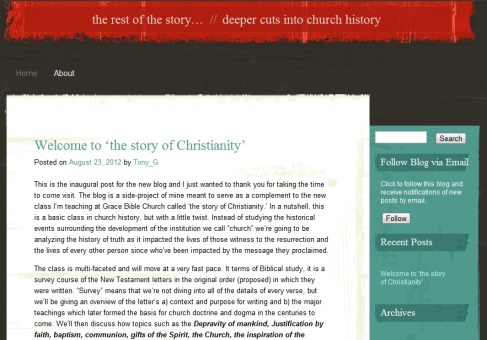This will be a little longer than a normal post.
I spent my last post trying to make the argument that Christians are not the only people in this world who live by faith. Why did I do this? Mainly because I often see Christian believers lacking confidence in the truthfulness of what they believe, especially when confronted by someone who thinks the concept of living by faith is foolish. I want to unpack my argument and illustration a little bit more in this post since it was difficult to do so in under 500 words the last time I wrote.
In the previous post, I used the example of a person who tries to learn about apples by making observations of a few apples and then drawing some conclusions about them. In logic, this is called inductive reasoning and it is used to summarize a variety of observations into a generalized statement (also known as a theory). The goal is testing those theories and trying to determine which ones are facts. Someone using inductive reasoning might say “Every swan I see is white, therefore all swans must be white.” Now, this method of reasoning is good for the purpose of summarizing data and drawing some conclusions, but its problem is that at the end of the day, it is unverifiable. In the example of the swans, there is the possibility that a black swan could exist somewhere out in the world and it just has never been recorded. We may only see white swans now, but the possibility that a black swan could exist somewhere means that the statement “All swans are white” can be disproved, but it cannot ever be verified as a fact. In fact, for hundreds of years people in Europe assumed that all swans were white because all known records about swans always documented them with white feathers. This changed when a Dutch expedition to Western Australia in 1697 discovered a black-feathered swan. Some of you might recognize this illustration from the title of the best-selling book by Nassim Taleb in 2007 called The Black Swan (I haven’t read this yet, but I plan on making it one of my first purchases if an Amazon Kindle happens to wind up in my stocking this year at Christmas (only $139)…hint, hint 🙂 ).
Ok, so why talk about inductive reasoning? What is your stink’in point, Tony?!? Well, inductive reasoning is the basis for the scientific method. This is huge. Why? Well, think for a second about why we started teaching evolution and the “big bang” theory in our public schools rather than the biblical account about the creation of the world. Think about why schools that were founded to train pastors for service in Christian ministry (Harvard, Yale) eventually began questioning the authenticity of anything they assumed as unverifiable in the text of the Bible (miracles, Christ’s resurrection, the inspiration of Scripture, prophecy, etc). These things happened because the conclusions that scientists came to about these matters were different from the beliefs people had historically held about them. What they assumed was that since science helped mankind understand so much about the physical world, then that same scientific method must be capable of showing us what we can or cannot believe about religious matters. What is believed by “faith” then becomes inferior to anything that can be known through scientific conclusion. If one has faith, let it be faith in science.
The problem for the one who puts faith in the scientific method is that at its core, it is just that: faith. The scientific method itself was developed by the same inductive reasoning it uses to learn about the world. As science has developed, scientists have never been able to verify their conclusions. Any conclusion they come to is always a probability statement (which is the glass jaw of inductive reasoning, as I showed earlier). Despite this, scientists have actually grown in their admiration of the method and continued to put more faith in its usefulness. This is crazy. The trustworthiness of this method hasn’t improved and yet our faith in it has grown incredibly?! Why?!?
Now…what the scientists have done here is quite sneaky. They’ve actually tried to steal something from the way a Christian believer reasons about truth. Why do I say that? It is because the scientist has tried to take a method that is based in inductive reasoning and (when no one is looking) slap a label on it that says “Deductive Reasoning USED HERE!” Here is what I mean by this:
Deductive reasoning starts out with a truth statement and then draws conclusions from it. It sounds like this: Thanksgiving always lands on a Thursday. Therefore, if today is Thanksgiving, then it must be Thursday. That is basic deductive reasoning. If you notice, I started with a statement that is always true: Thanksgiving always lands on a Thursday. It was from this statement that I could make a conclusion about what day of the week it was when I knew that it was Thanksgiving.
Deductive reasoning is king when it comes to learning about truth. It starts with a truth statement and makes conclusions about what can be logically implied from that truth statement. The only problem with deductive reasoning is (as some of you I’m sure have caught on): you have to first find the truth statements!! So, how does this relate to what the scientists have done with the scientific method? Well, since scientists have put so much faith in the ability of their method to learn about their world, they’ve actually begun believing in its infallibility and have made the statement “science is truth” the truth statement necessary to begin reasoning deductively. We see this, for example, every time someone really presses a scientist to defend one of their conclusions. Eventually they say: “We know this is true because science tells us it is.”
WOW. It is as if the scientist dubbed over a recording of a Christian saying “we know this is true because God tells us it is” and replaced God with science!!
You can see the problem in this, can’t you? If so, good. Philosophers have been seeing straight through this “bait-and-switch” for a while. You can’t use a conclusion drawn inductively as the truth statement necessary to then reason deductively. You just can’t. When it comes to verifiable truth, science is still inferior to any belief system that can start with a truth statement and work deductively. This is where the Christian comes in.
“Wow…1000 words and you’re still not done, Gryckiewicz?!”
Nope…here’s the point (or maybe point #3 or 4, I’ve lost count): The Christian belief system is built on a whole series of truth statements called revelation. Revelation is God’s self-disclosure of Himself through history. Generally, it is found in His creation and the inherent moral instincts of mankind. Specifically, it is found in God’s words that He has spoken through His prophets and Christ’s Apostles (Scripture). These are the truth statements that Christians are able to use to deduce all matters of truth about life. We know that God exists and we believe that His revelation is truth. We haven’t modified that belief since the creation of the world and no new evidence found can ever replace that belief. We don’t depend upon our ability to make observations so that we can determine for ourselves what is truth…we humbly submit to the only One capable of knowing all truth and we believe in what He says.
What’s funny is that over the past 50 years philosophers (atheists included) have actually been realizing the “bankruptcy of truth” that science has left us with. Some scientists have even been awakened to this reality. For example, see Antony Flew’s There is a God. Flew was a famous atheist scientist for years until he started realizing some of these things and changed his mind about the existence of God…I haven’t read it, but I plan on making it purchase #2 on the Kindle this Christmas (hint, hint).
Maybe I’ll talk soon about what contemporary philosophers have settled upon since the scientific method has failed us. Its very unsatisfying, just to warn you.
If you have comments, be sure to leave them at the website for the blog: https://atthetrailhead.wordpress.com/






